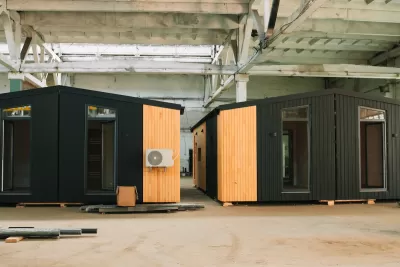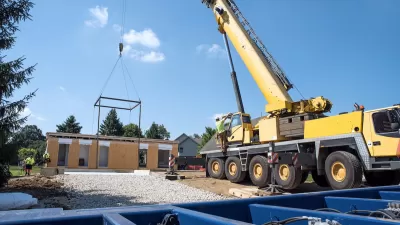Tweaks to building codes, zoning regulations, and financing mechanisms could unlock the potential of modular construction in the United States.

In an article for the Center for American Progress, Michela Zonta highlights the advantages of modular construction, arguing that encouraging more modular home building can reduce construction and housing costs, get homes built faster, and improve safety for workers.
According to Zonta, “If governments engage in coordinated initiatives at all levels to bring modular building to scale, it could also help make housing stock more resilient and sustainable relative to the challenges of climate change.”
While modular construction makes up just 3 percent of U.S. residential housing stock, it represents 45 percent of housing in Finland and Norway. “Several factors have limited the United States’ market share, including financing and payment schedules, building codes and zoning, transportation requirements, labor shortages and costs, and stereotypes.”
The article recommends that governments “Expand financial resources for the modular construction of affordable housing,” standardize building and land use codes for modular building, and incentivize more modular production through tax credits and other mechanisms.
FULL STORY: Fact Sheet: Using Modular Building To Increase Affordable Housing Stock

Alabama: Trump Terminates Settlements for Black Communities Harmed By Raw Sewage
Trump deemed the landmark civil rights agreement “illegal DEI and environmental justice policy.”

Study: Maui’s Plan to Convert Vacation Rentals to Long-Term Housing Could Cause Nearly $1 Billion Economic Loss
The plan would reduce visitor accommodation by 25% resulting in 1,900 jobs lost.

Why Should We Subsidize Public Transportation?
Many public transit agencies face financial stress due to rising costs, declining fare revenue, and declining subsidies. Transit advocates must provide a strong business case for increasing public transit funding.

Wind Energy on the Rise Despite Federal Policy Reversal
The Trump administration is revoking federal support for renewable energy, but demand for new projects continues unabated.

Passengers Flock to Caltrain After Electrification
The new electric trains are running faster and more reliably, leading to strong ridership growth on the Bay Area rail system.

Texas Churches Rally Behind ‘Yes in God’s Back Yard’ Legislation
Religious leaders want the state to reduce zoning regulations to streamline leasing church-owned land to housing developers.
Urban Design for Planners 1: Software Tools
This six-course series explores essential urban design concepts using open source software and equips planners with the tools they need to participate fully in the urban design process.
Planning for Universal Design
Learn the tools for implementing Universal Design in planning regulations.
Caltrans
Smith Gee Studio
Institute for Housing and Urban Development Studies (IHS)
City of Grandview
Harvard GSD Executive Education
Toledo-Lucas County Plan Commissions
Salt Lake City
NYU Wagner Graduate School of Public Service





























